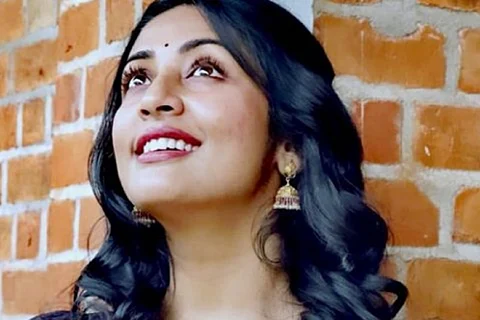

Microphones are thrust into her face, the same question asked over and over again – why did you not react? Navya Nair is admirably calm in the face of the repetitive question, answering for another actor’s doing. Vinayakan, her co-actor in Oruthee, a film she’s making a comeback with, made some problematic statements last week, directing a few of them to a woman journalist. It was a promotional meeting for Oruthee, and Navya was present on the stage along with Vinayakan and a few other men, including the film’s director VK Prakash.
But the questions kept seeking Navya, not the others. Those asking wanted to know, “Why did you (Navya) not react when Vinayakan said these things?” ‘These things’ include a claim of not knowing what the Me Too movement is, asking questions of the reporters who raised them, and making ignorant and problematic statements about consent and sex. Navya, on the stage, can be seen visibly uncomfortable, while VK Prakash is seen laughing at several of Vinayakan’s statements.
Vinayakan had at the time claimed that he did not know what Me Too meant. Unasked, he went on to share that he “asked the consent” of all ten women he has had sex with, reducing the concept of consent into a question of yes and no, without taking into account power and gender inequalities. It was after this that he pointed to a woman journalist at the event and furthered his example, saying he would ask for her consent if he wanted to have sex with her.
Watch: Answering Vinayakan's big question: What is Me Too and consent
“It is quite wrong, what he (Vinayakan) said at the event. He has apologised for it on his Facebook page,” Navya said to the bulging mics on Sunday. But the questions were insistent – why didn’t she stop Vinayakan, she was a woman. Navya, still keeping her calm, went on to state a most simple fact: “every person may have a different level of reactionary power, I only had so much at the time."
And then she added, “You should understand that for what a man said, it is still another woman who is being crucified here.”
The plain truth of the matter, something that the mediapersons, apparently outraged at the treatment of their woman colleague, did not seem to get. They were not asking Navya what she thought about Vinayakan’s conduct. They were pretty directly putting the onus on her, to react when a male colleague said something wrong, to be the one responsible for the doings of older more experienced adults with her. Because ‘she is a woman’ – this reminder about her gender came a second time, disappointingly, from another woman reporter.
It is a wonder that the irony is lost on them. They were apparently reacting on behalf of a fellow reporter – a woman – but putting another woman on the spot for it. Navya says at one point, she was your colleague, any of you could have reacted right then.
They should know that reactions need not be spontaneous. Neither the injured party, nor the people who empathise with the aggrieved woman, need react on the spot. That’s the essence of the whole #MeToo movement which started this discussion. Delays in reaction do not take away the survivor’s credibility.
In Navya’s case, she is neither the victim nor the perpetrator, just an unfortunate bystander. She needn’t even give a delayed reaction about what her male colleague did. She may have a strong opinion on the matter, but it is entirely up to her to express it. Being the only woman on a stage where a man made some crass comments does not make her answerable. Because Vinayakan is not 10, and Navya is not his parent.
Despite the fact that she need not be answerable about this at all, Navya makes it clear that she does not agree with Vinayakan’s statements. She had tried to get hold of the microphone that day but failed to, she later told reporters. She has also been incredibly patient with their questions. This was supposed to be about Oruthee, she said, ironically a movie that tried to send a message about women’s empowerment. The film was about how a woman learnt to react to difficult situations when she’s put through them, Navya said.
She has been very clear about her stand on misogyny - in a previous interview with TNM, Navya said she will not be part of films that glorified it. After Oruthee’s release she had just wanted to enjoy her comeback to Malayalam cinema, she said. Yet, she was forced to apologise for someone else’s mistake.
Views expressed are author’s own.